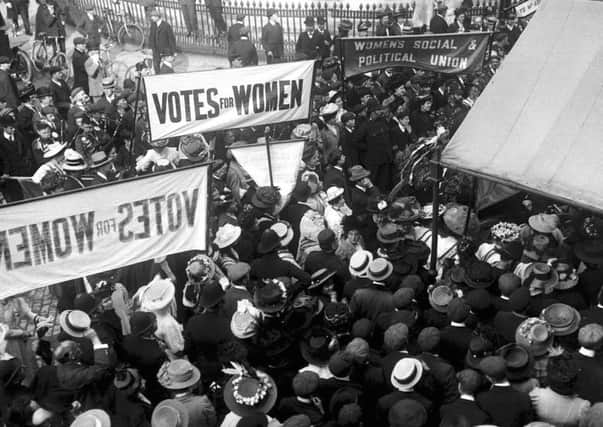Jayne Dowle: Two cheers for democracy as women fight for rights


Send up a silent prayer to the Pankhurst family and all the other suffragettes and suffragists who fought tooth and nail. Tomorrow marks the 100th anniversary of women receiving the right to vote in the UK.
This hard-won parity will be the focus of celebrations and rightly so. However, before we get too carried away, it’s worth reminding ourselves of what the Representation of the People Act actually meant.
Advertisement
Hide AdAdvertisement
Hide AdPractically all men over the age of 21 were allowed to vote, regardless of social class or property ownership. This was well overdue. Even after the passing of the Third Reform Act in 1884, only 60 per cent of male householders over the age of 21 could legitimately visit a polling station.
People tend to forget this. Throughout all the industrial strife which scarred the late 19th and early 20th century, millions of working men did not possess the democratic right to vote because they did not own their own home.
Why else do you think that property ownership has become such a big deal in this country? Somewhere in our collective DNA is the sense that only a name on a deed gives you the right to fully participate in life.
It’s certainly entrenched in my own family. Researching our family tree recently, I had to stop and look twice at an entry for my paternal great-grandfather, a miner born in 1875 who never owned a house in his life.
Advertisement
Hide AdAdvertisement
Hide AdThere he was on the electoral register in the 1930s, fully enfranchised. Interestingly, his wife was not down beside him. I’m presuming that the Representation of the People Act didn’t count if your husband said “no”.
Equality was never going to be automatic. The 1918 reform only applied to around eight million women; those who were at least 30 years old, and they had to either own a property or be a graduate voting in a university constituency such as Oxford or Cambridge.
So the young working class woman living in a rented house, who had slaved through the war in a munitions factory, still couldn’t say who should represent her interests in Parliament.
Yet her brother, who lived next door, could. Some equality, eh? Although Ireland achieved full parity in 1922, women in Great Britain had to wait another decade, until the Representation of the People (Equal Franchise) Act in 1928.
Advertisement
Hide AdAdvertisement
Hide AdThere is an argument put forward by some historians that the reason why this 1918 breakthrough was so biased was to prevent women voters dominating elections. So many men had been lost in World War One, if the same terms of enfranchisement had applied across both sexes, men would have been in a minority and women would have called the shots.
This pre-supposes quite a lot of things about women and political responsibility that we might find hard to accept. Of course, some of the prejudices can be put down to the prevailing social attitudes of late Edwardian times. Some, however, are still with us and more rife than ever.
Sorry to rain on the victory parade, but much of the grudging equality still being meted out to women today has its roots in this most unequal 1918 Act.
If our Edwardian political forebears had only possessed the foresight to take the opportunity to create a level playing field, we might not still be having to fight for every piece of legislation that represents our interests; equal pay, protection against all forms of domestic abuse, maternity rights, fair divorce and abortion laws, for example.
Advertisement
Hide AdAdvertisement
Hide AdRather, women were ushered into the democratic process fettered by a selection of caveats and excuses that has not served us well. There is still the lingering sense in some quarters of all political parties that we shouldn’t really be there at all.
Although the partial enfranchisement of women did lead to a steady trickle of female MPs from the 1920s onwards, progress in Westminster remains painfully slow. The last General Election was the first time that more than 200 female MPs were elected to Parliament; women took 208 out of 650 seats. That’s still less than a third.
I’m not being entirely churlish; my maternal grandmother, who was born in 1910, never forgot to remind me of the struggles that all women had to go through to have their views represented in the democratic process. The idea of not using her vote was anathema. Even in her fragile and advancing years, grandma would take advantage of a lift to the polling station and make her cross in the box in local and general elections alike.
It’s because of her example that I never fail to vote, even if it’s to abstain as a mark of protest at the lack of convincing candidates. And it’s because of her example that I’ll take a few quiet moments to think tomorrow.
However, I’ll keep the bunting packed away and wait another 10 years until I can celebrate the representation of all women in the democratic process, not just the privileged few.